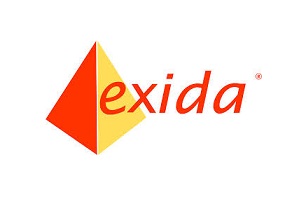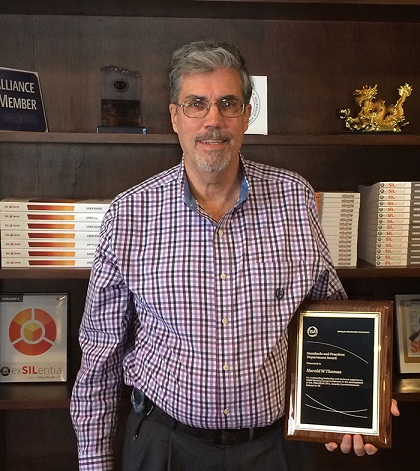 Exida, one of the leading certification bodies for functional safety and security standards, assessed RPC Radiy’s RadICS FPGA-Based Safety Controller (FSC) per the relevant requirements of IEC 61508:2010, parts 1-7 and found that it meets requirements providing Safety Integrity Level (SIL) 3.
Exida, one of the leading certification bodies for functional safety and security standards, assessed RPC Radiy’s RadICS FPGA-Based Safety Controller (FSC) per the relevant requirements of IEC 61508:2010, parts 1-7 and found that it meets requirements providing Safety Integrity Level (SIL) 3.
Radiy’s RadICS FSC will read input signals, perform user-defined application layer logic and write results to the output signals within the stated response time. The FSC can be used for design and development of SIL 3 level applications.
“Radiy has developed unique technology that utilizes FPGAs to implement logic solver capabilities,” said Dave Butler, exida evaluating assessor. “Their strong development process ensures the delivery of products that achieve high levels of functional safety.”
The following is from the exida assessment report:
“The audited development process as tailored and implemented for the RPC Radiy FPGA-based Safety Controller (FSC) RadICS development project, complies with the relevant safety management requirements of IEC 61508 SIL 3.
“The assessment of the FMEDA, done to the requirements of IEC 61508, has shown that the FPGA-based Safety Controller (FSC) RadICS can be used in a Low Demand safety related system in a manner where the calculated PFD AVG is within the allowed range for SIL 3 (HFT >= 0) according to table 2 of IEC 61508-1.
The RadICS platform (see Fig. 1) is a set of general-purpose building blocks that can be configured and used to implement application-specific functions and systems. The RadICS platform is composed of various standardized modules, each based on the use of FPGA chips as computational engines.
The basic configuration for the RadICS platform consists of an instrument rack containing two logic modules, as well as up to 14 other I/O modules and fibre-optic communication modules. Logic modules gather input data from input modules, execute user-specified logic, and update the value driving the output modules, as well as gather diagnostic and general health information from all I/O modules. The I/O modules provide interfaces with field devices (for example, sensors, transmitters, actuators). The functionality of each module is driven by the logic implemented in the on-board FPGA(s).
The basic set of I/O modules consists of analogue and digital input, and digital output modules. There are also special-purpose I/O boards designed for specific field detectors and devices, such as resistance temperature detectors (RTDs), thermocouples, ultra-low voltage AI boards used for neutronic instrumentation, actuator controller modules, and fibre-optic communication modules that can be used to expand the I&C system to multiple chassis. It is also possible to provide inter-channel communications between 2, 3 or 4 channels via fibre-optic communications directly between logic modules.
The backplane of the RadICS platform provides external interfaces to power supply, process I/Os, communication links, and local inputs and indicators. The internal backplane interfaces provide connections to the various modules that are installed within the chassis by means of a dedicated, isolated, point-to-point low-voltage differential signalling (LVDS) interface.
Nike Air Max
 The Certified Functional Safety Expert (CFSE) Program has introduced new ICS cybersecurity personnel certification specialties: The Certified Automation Cybersecurity Expert (CACE) and Certified Automation Cybersecurity Specialist (CACS). These have been developed in response to the growing demand to secure industrial automation control systems (IACS) and SCADA systems by providing a means for people to develop and demonstrate competence by understanding and applying security standards such as IEC 62443/ISA-99, as well as best practices.
The Certified Functional Safety Expert (CFSE) Program has introduced new ICS cybersecurity personnel certification specialties: The Certified Automation Cybersecurity Expert (CACE) and Certified Automation Cybersecurity Specialist (CACS). These have been developed in response to the growing demand to secure industrial automation control systems (IACS) and SCADA systems by providing a means for people to develop and demonstrate competence by understanding and applying security standards such as IEC 62443/ISA-99, as well as best practices.
 exida, the global leader in functional safety certification for the process industries, has certified the Riken Keiki SD-1RI Infrared Gas Detector for functional safety, ensuring that it meets the functional safety requirements for Safety Integrity Level (SIL) 3 capability per IEC 61508: 2010.
exida, the global leader in functional safety certification for the process industries, has certified the Riken Keiki SD-1RI Infrared Gas Detector for functional safety, ensuring that it meets the functional safety requirements for Safety Integrity Level (SIL) 3 capability per IEC 61508: 2010. Hal Thomas, exida Partner has been awarded the ISA Standards and Practices Award for his outstanding leadership and technical expertise as ISA84 Working Group 9 chairman in the development of ISA-TR84.00.09-2013, Security Countermeasures Related to SIS.
Hal Thomas, exida Partner has been awarded the ISA Standards and Practices Award for his outstanding leadership and technical expertise as ISA84 Working Group 9 chairman in the development of ISA-TR84.00.09-2013, Security Countermeasures Related to SIS. ABB has announced that its operations in Canada have been certified by TÜV SÜD as having in place and applying a Functional Safety Management System (FSMS) for the design and engineering of safety instrumented system (SIS) projects in accordance with industry good practice safety standards. These standards include IEC 61508 and IEC 61511 for the integration and implementation of safety instrumented systems.
ABB has announced that its operations in Canada have been certified by TÜV SÜD as having in place and applying a Functional Safety Management System (FSMS) for the design and engineering of safety instrumented system (SIS) projects in accordance with industry good practice safety standards. These standards include IEC 61508 and IEC 61511 for the integration and implementation of safety instrumented systems. Exida, one of the leading certification bodies for functional safety and security standards, assessed RPC Radiy’s RadICS FPGA-Based Safety Controller (FSC) per the relevant requirements of IEC 61508:2010, parts 1-7 and found that it meets requirements providing Safety Integrity Level (SIL) 3.
Exida, one of the leading certification bodies for functional safety and security standards, assessed RPC Radiy’s RadICS FPGA-Based Safety Controller (FSC) per the relevant requirements of IEC 61508:2010, parts 1-7 and found that it meets requirements providing Safety Integrity Level (SIL) 3.